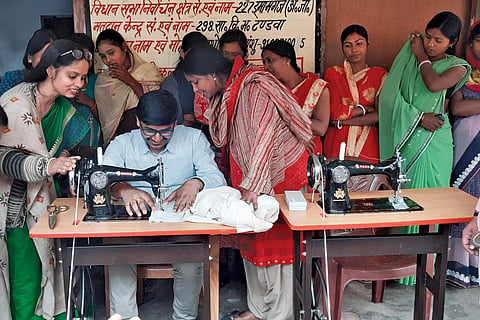

Sakaldev Yadav of Chotki Chapi village in Bihar’s Gaya district is growing lemongrass on a small portion of his 2.4 hectare (ha) paddy field for the first time. He has already invested Rs 25,000 in procuring the seeds and hopes to earn a handsome return five years later when he processes the harvested crop into oil and sells it for Rs 1,300-1,500 a litre. Besides the monetary gains, Yadav is excited about the lemongrass crop for another reason.
If harvested successfully, his family will never have to go back to growing opium again. Almost all families in his village have been growing opium illegally for over a decade. “In 2009, when I was about nine years old, there was widespread poverty in the village. Apart from selling dry wood at a market 15 kilometres away, we had no other steady source of income,” says Yadav.
So, residents turned to opium farming as it assured a steady income of at least Rs 1 lakh a year for 0.4-0.8 ha of the crop. There was a huge demand from Punjab, Haryana, and Rajasthan, he recalls.
Over time, the crop also became the reason the entire village started to live in constant fear of police raids and arrests.
According to government data, opium crops in over 400 ha have been destroyed through raids in the four years between 2015-16 and 2018-19. At its peak, opium was cultivated in over 1,300 ha in Gaya district, of which 300 ha was inside the Gautam Buddha Wildlife Sanctuary.
Fed up with the raids, women farmers from Chhotki Champi and seven other neighbouring Gaya villages in 2019 reached out to the local administration for help.
“We knew our approach to stop opium cultivation by force was not working, so we joined with the women to spread awareness against it,” says Abhishek Kumar, divisional forest officer, Gaya.
The forest department started by organising skill development trainings for the farmers in bee-keeping, sewing, besides introducing them to lemongrass, drumstick trees (Moringa oleifera) and mahua (oil-nut or Madhuca longifolia) flowers. Next, the district administration released funds to set up processing units in the villages.
Jaigir village, for example, now has a lemongrass oil processing unit. Similar units have been set up in different villages to process honey and drumstick powder, and manufacture tilkut (a sweet made from mahua flowers). The forest department currently sells the products under the brand name Aranyak.
Kumar says the initiative has reduced the opium cultivation in the region as it has given a lucrative alternative to opium farming and generated employment. He believes that the success of the initiative will attract the remaining opium farmers in the days to come.
This was first published in Down To Earth’s print edition (dated 16-31 January, 2022)